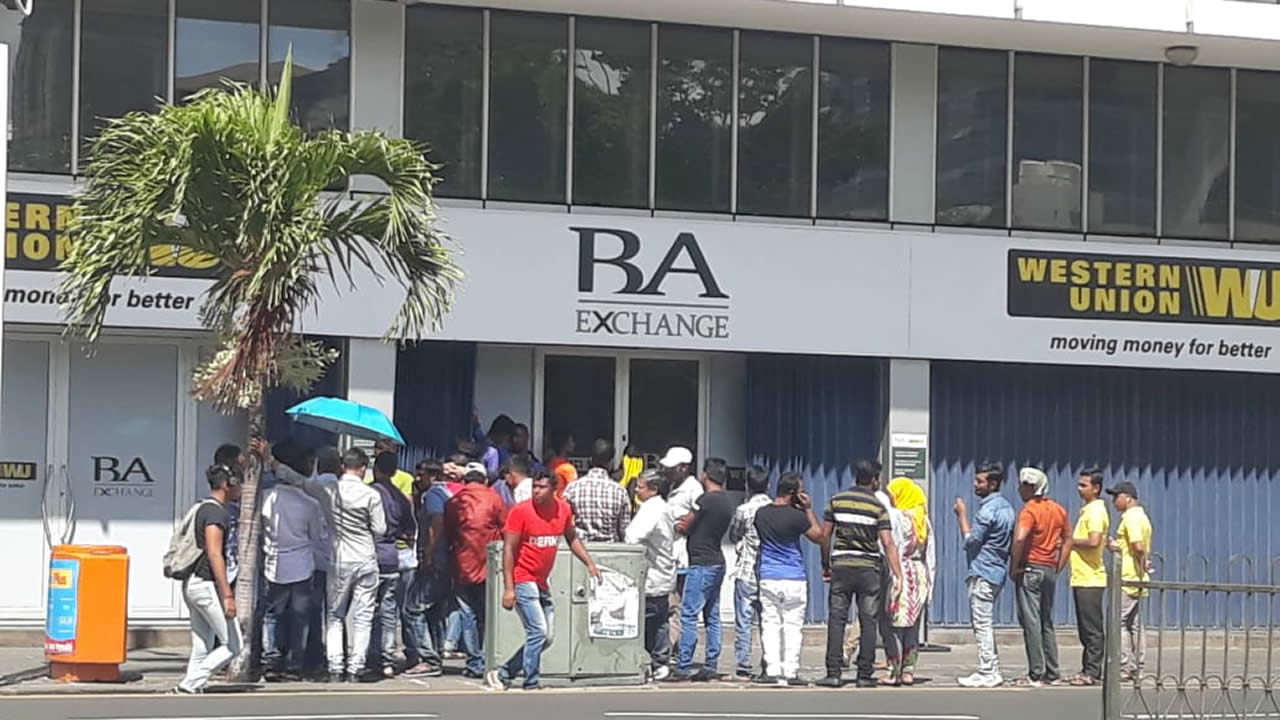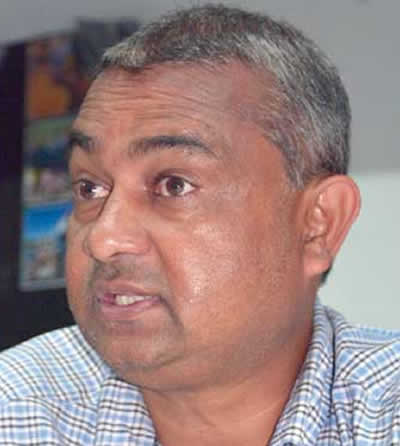
The Tracking Team of the Passport and Immigration Office has over the past few weeks arrested several foreign nationals who have been illegally staying in the country. Among them, Bangladeshi and Indian workers and Malagasy visitors. The workers have left their employers since long and were working illegally while the visitors have overstayed while being on tourist visa. The trend of Illegal stayers is a growing phenomenon. But what are the reasons?
With Mauritius facing shortage of labour in many sectors of the economy, many migrant workers are lured into illegal staying in the country to continue working after the expiry of their work permits. Others may still have a valid work permit but they choose to abandon their employers who then report them as missing. This trend is gaining ground and illegal migrants are rising in numbers. The Tracking Team of the Passport and Immigration Office has been very active lately, arresting many over-stayers across the country. The authorities believe the migrant workers become victims of human trafficking and are then exploited by unscrupulous employers. It is illegal for anyone to give employment to a foreign national without a valid work permit.

Trade unionist Faisal Ally Beegun says he does not agree with the authorities' argument that there is human trafficking behind the stay of illegal foreign workers. “I have always said that many foreign workers are already victims of human trafficking from the moment they deal with unscrupulous recruiting agents who promise them wonders and fleece them financially. There are some recruiting agents whom I call human traffickers,” says the unionist. He adds that the Government has since long proposed to review the entire system of recruitment of foreign workers, for example, to no longer use agents, to simplify the process and make it more transparent to prevent foreign workers from being victims. Unfortunately this is taking time, though the ministry is working on it. He claims that he himself has already denounced more than 50 recruiting agents for their inappropriate actions, but no action has been taken.
The unionist says that on one side, there are people who arrive on a tourist visa and tries to obtain employment illegally, while, on the other side, foreign workers holding a valid work permit choose to abandon their employer and disappear in society for a number of reasons. “It's a real human tragedy. The recruiting agent promises them huge salaries and perks. A foreign worker sometimes pays up to Rs 250,000 as commission fee to the agent in order to bag a job in Mauritius. He normally contracts a loan or sells his family property. Once in Mauritius, he realises he has been duped. The salary is around Rs 8,000 and working conditions are harsh. Some employers do not respect working conditions. Others do not pay salaries regularly,” explains Faisal Ally Beegun. Caught in a trap, the worker is then forced to escape, thinking that he will work in the underground economy in order to earn a maximum amount of money so that he can return to his country and pay his debts. The unionist draws a parallel with the era of slavery, when slaves fled their masters to avoid further misery. “When nearly recaptured, they preferred to jump to their death off the mountain rather than going back to a life of misery. Today, we deport the illegal migrants instead of understanding his situation and assisting him.” He says many face threats back home if they fail to reimburse their debts, their families are harassed. Some workers have even contemplated suicide.
The unionist deplores the manner in which illegal immigrants are arrested. For him, it is an attack on human dignity to corner them live on camera. Illegal workers have the right to be represented by a lawyer or trade union.

Reaz Chuttoo, a representative of the ‘Confederation des Travailleurs du Secteur Privé’ (CTSP), blames the former government for allowing foreigners entering with a tourist visa to apply for a work permit (Editor's note: Today, it is no longer possible to convert a tourist visa into 'business' visa.) This opened the door to abuse. He says that many illegal workers end up working as helpers or in small businesses that cannot officially recruit foreigners. “I believe there are a lot of illegal immigrants in Mauritius. When the CTSP was on a trade union mission to Bangladesh, we were told by officials there that they estimate a total of 50,000 Bangladeshi citizens living in Mauritius, whereas our own official figures show 30,000 to 35,000 registered workers.
I think the situation will get worse. It is time to put some order because we will have to continue depending on foreign workers in the future, given our ageing population. Those who are deported try to come back under a new passport with a new name.” He reveals that many Bangladeshi recruiters operate under the ‘patronage’ of some Bangladeshi politicians, and the workers in some cases have to pay half of their salary to these agents and politicians. “That's real human trafficking.” His union recently organised an event to denounce human trafficking. “The Government has promised a lot of changes, so far these are just statements of good intentions, we are waiting for their implementation,” concludes Reaz Chuttoo.
The source of the problem
According to trade unionists, it is a real 'business' that takes place and that benefits many people at several levels. First, the recruiting agents! Some claim significant fees to facilitate recruitment. In the case of clandestine workers, there are landlords who rent houses to illegal workers. When the police track down and stop the illegal immigrants, the owners of the houses are not always bothered though, indirectly, they encourage clandestine workers. Then there are those enterprises which recruit these illegal workers. Some are exploited further by their new bosses because the illegal workers have no recourse to complain once they become overstayers.
At company level, workers told us that some human resources managers are hand in gloves with recruiting agents as they perceive a commission on each new recruit. Thus, they may recommend the company not to renew employment contracts after two or three years but to recruit new employees from abroad, thus increasing their personal gains while it is the poor worker who pays for this. There are also cases where employers do not renew work permits so as not to incur costs, but workers continue to work within the company, even if their status is illegal. With an expired permit, the worker must suffer the whims of the employer, because if he complains to the Labour office, the employer will end his job and send him back home.
An illegal worker speaks
His name is Mr. A.M from Bangladesh. We met him on the outskirts of the Mauritius Commercial Bank one Sunday morning in Port Louis. Hundreds of workers flock to the MCB or to the Western Union office at Pope Hennessy Street, Port Louis every Sunday to transfer their money to their families. A.M came to Mauritius under a contract of employment with a valid work permit but soon became discouraged when he saw that the real wage was different from what he expected. “My mother suffers from kidney failure, and the treatment is costly in my country. I was thinking of working hare and saving money to send her every month, but it is not possible.” He was forced to leave his employer and he tried to obtain jobs here and there, in order to maximise his income. But is he not afraid of being caught by the authorities? “I am not in an illegal situation. I have only left my employer. I have no choice, I cannot return to my country empty-handed. I spent a fortune to come here and I still have debts to repay,” he says.
Proposals
A work permit must be transferable. If an employee is not satisfied with the working conditions, he must be authorised, after an investigation by the authorities to verify the veracity of his complaint, to take up employment with another employer, without having to leave the country, in the same way as ‘Occupation Permit Holders’ can change employers at will, without having to leave Mauritius and come back.
- The law must be very strict on those who accommodate illegal workers or rent rooms/houses to them.
- We must stop with the system of private recruitment agents. Authorities should use the official recruitment offices of the countries concerned.
- If an employer wants to repatriate a worker before the end of the contract, he must inform the ministry which must investigate the reasons before issuing a ‘clearance’.
- Before deporting an illegal migrant, the authorities should investigate his situation and see whether it is possible to find another employer for him and legalise his situation to allow the worker to earn decently.
Europeans too!

Contrary to popular belief, it is not only Asian or African workers who try to overstay or work illegally in Mauritius. There have also been cases where Europeans who arrive on a tourist visa are hired during their stay, especially in the hospitality industry. Since there are practically no (or little) ‘crackdown’ operations in these environments, it is difficult to know the extent. This practice is also common among non-citizen residents in Mauritius (investors, professionals, etc.) who bring their relatives and employ them informally for short periods. There is equally the case of holders of residence permits under the RES or PDS who work in Mauritius or who run businesses when they are not entitled to do so. Another phenomenon is the case of foreigners who operate online businesses, without holding the appropriate licenses (e.g. real estate agents), and thus escape to the tax authorities.
Jane Ragoo : “They must not be the only ones who pay”
Trade unionist Jane Ragoo is of the opinion that monitoring exercise should be beefed up at the level of the Ministry of Employment, given the rising number of illegal workers arrested by the immigration services. While she praises the authorities’ crackdown operations, she believes that these operations should be more frequent and more serious, because, according to her, there must be many more illegal foreign workers hiding in Mauritius.
“But the clandestine workers must not be the only ones to pay. There is also the responsibility of employers. Why did the workers flee their employers?” Jane Ragoo exclaims. The trade unionist also deplores the “inhuman” way in which illegal immigrants are arrested and deported. “Yes, they committed an offence, but they are not criminals. They were only working. Before deporting them, we must see if their employers owe them unpaid wages.”
The need for foreign labour
Many enterprises face severe shortage of labour and have difficulties in recruiting people. “It is difficult to find committed workers. Most are only looking for a job to keep them going and they are always on the lookout for another job.
This increases labour turnover,” says an employer. He explains that it is costly to train workers and then see them leave after a short period. “The company must then recruit other workers, and the same cycle repeats.” For some activities, even though we place job adverts, we do not receive any response, as people are either not interested in some types of jobs or they do not have the required competencies.”
Recruiting foreign labour is not that easy as the process is long. An employer has to advertise in two local newspapers and prove that he has been unable to find local workers. “But even if we do find them, there is no guarantee that the worker will stay.” To apply for foreign labour, the employer must provide suitable lodging. “Hiring a foreign worker is costly, but we have no choice. If we could find local labour easily, we would not need to import.”
Why resort to illegal workers?

Companies that cannot find labour for certain activities (bakery, livestock, small contractors, etc.) and whose applications for a permit to import foreign workers are rejected often resort to illegal workers. It is the illegal workers themselves who approach businesses to offer their labour. While some entrepreneurs refuse to hire them, others see them as a solution to their labour shortage problem.
Legal workers doing part-time work
In contrast to illegal immigrants, there are many foreign workers with valid work permit who work on a part-time basis, at other companies or with individuals, during the weekend or during their days off. The goal is to increase their income so that they can send more money to their parents and families back home. “Sitting at home is not viable, so we always try to spend our idle time in part-time work. Some people are very generous, and they pay us good money for part-time work and we provide a good service” says Jahal, a Bengladeshi factory worker. Most do odd works such as cleaning, painting, gardening, or work as helpers, while female workers obtain jobs as house maids.
 J'aime
J'aime















